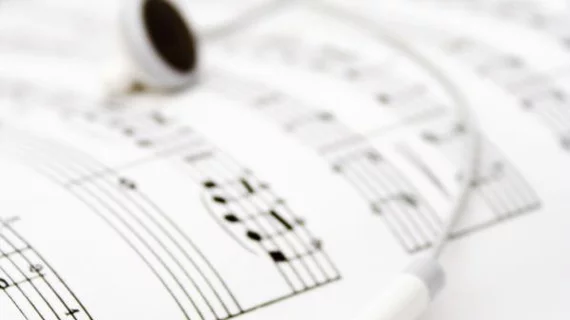Music therapy can be a helpful neurorehabilitation tool for acute stroke patients on the mend, according to research published in Topics in Stroke Rehabilitation.
Study lead Alex Street, PhD, a senior research fellow at Anglia Ruskin University in the U.K., and colleagues wrote in their paper that music therapy has proven a useful exercise for helping stroke survivors through mood regulation, improved concentration and neural reorganization. Picking up a musical instrument can also improve arm function and gait.
Street and his team studied 177 stroke patients who took part in a total of 675 neurologic music therapy (NMT) sessions over a two-year period at Addenbrooke’s Hospital in Cambridge. NMT sessions were run alongside standard-of-care stroke treatment, including physiotherapy, occupational therapy, speech therapy and clinical psychology, and the authors tracked its success among patients, their relatives and their healthcare teams.
“The fact that 674 sessions were carried out in two years is in itself an indication of the success of the treatment,” Street said in a release. “It shows that staff are referring patients because they understand the mechanisms of the exercises and can see how it can benefit their patients. It also shows that patients are willing to do the exercises, with each one participating in an average of five sessions.”
Patients not only picked up physical instruments like drums, handheld percussion and keyboard, but were also provided iPads that featured touchscreen instruments. Street et al. said the tech element was designed to help patients with hand rehabilitation through improving finger dexterity and cognitive training.
On average, the 139 patients, relatives and hospital staff who answered Street and colleagues’ questionnaires said NMT was either “helpful” or “very helpful” for themselves or their patients. Fifty-two patients completed a mood scale questionnaire, revealing a reduction in “sad” responses and an increase in “happy” responses immediately following an NMT session.
Street said the therapy was received “enthusiastically” by patients, families and staff alike. Speech and language therapists on the project reported a positive impact on patient arousal and engagement with NMT—both factors that may help stroke survivors overcome low mood and fatigue after their event.
“Staff felt that using music and instruments allowed patients to achieve a high amount of repetition to help achieve their goals,” Street said. “They felt that the exercises appear less clinical, because the patients are playing music with the music therapist, and they are receiving immediate feedback from the exercises through the sounds they create.
“Further research is necessary to establish potential effects of music therapy on recovery rate and length of hospital stay."

